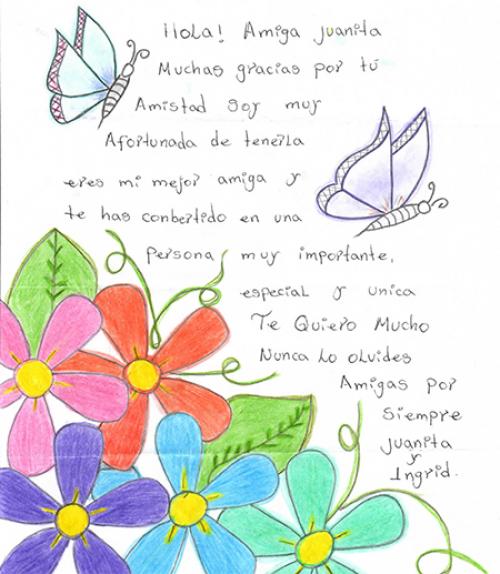
Join CADA (Cornell Anti-Detention Alliance)
Migration is about movement, yet the journey often ends in the denial of movement, especially if one migrates to the U.S. This country detains more immigrants than any other country in the world, often in deplorable conditions. Yet many people in this country do not know about these conditions, which amount to imprisonment for the simple act of crossing a border without papers. The detention centers are often geographically isolated, compounding the isolation of the people being held there. The situation has been exacerbated in recent years due to the increasingly draconian and punitive policies advanced by the Trump administration, making immigration detention an urgent human rights issue.
Under the auspices of an Engaged Cornell curriculum grant, FGSS started working in 2019 to address this social justice issue, focusing on the Buffalo Federal Detention Center in Batavia, NY. We began by working with the Buffalo-based group Justice for Migrant Families (JFMF), a group that provides direct support for detained people, including visitation, connection to legal aid, reporting abuses, and other forms of advocacy. In fall 2019, we made five trips to Batavia and formed connections with people being held for whom we are still advocating (see, for example, our petition to release a Salvadoran woman who has been held for more than two years: @freeingrid | Linktree).
In January 2021, our group formed an alliance with the Freedom for Immigrants anti-detention national group (freedomforimmigrants.org) and renamed our chapter the Cornell Anti-Detention Alliance, or CADA. We are expanding our reach across campus; see the FGSS calendar for meeting times.
Collaboration with people in detention transforms the notion of “visitation’ from one of benevolence or charity into a grassroots struggle for systemic change. While we valorize the power of the face-to-face encounter, we also aim to place these individual encounters within a larger structural analysis. What prompts each person to have to leave their home countries? What immigration policies have caused them to be held in detention rather than being released on their own recognizance or on bond? How are they negotiating the labyrinth of immigration law—the only legal arena in the U.S. that does not guarantee people the right to an attorney?
We put the theory into practice through the following steps:
- Visitation. FFI helps us coordinate these visits, as they have set up a system for communicating with detainees and arranging visits (a cumbersome process that involves phone messages and knowledge of people’s “alien registration numbers”). How do we conduct these visits with empathy and generosity so as to establish rapport, valorize their experiences, and counter the dehumanization of immigrants? These goals are hampered somewhat by the physical situation: we are separated from the detainees by a window and must talk on a phone that often crackles. This one-hour period may be the only time during the week when the person feels in control of their encounter, so it is especially important that we learn how to actively listen and process their needs rather than imposing our sense of what matters or what needs to be done. These constraints have of course been exacerbated by the Covid-19 pandemic; all in-person visits to Batavia have been halted. Many of us are now volunteering for the phone line that JFMF set up to reach people inside.
- Documenting conditions in the Batavia center. Due to the fact that Immigration Control and Enforcement (ICE) operates in a no-man’s land of little accountability, it is difficult to ascertain what is happening inside. Our conversations thus become a critical site of potential intervention. We ask what detainees need in terms of their health (physical and mental), food, religion, contact with families, and reading materials. We inquire into whether they are having any issues with guards or other detainees. After the visit, we enter this information into the Freedom for Immigrants’ database (known as Vianey); the national group can then track where abuses are occurring and plan for what might be done.
- Writing their narratives. How do put these stories into an accessible format while also maintaining the integrity of their experiences? These stories come from both people detained—if they feel comfortable sharing information—as well as people released from detention, awaiting their hearings or deported. JFMF keeps in touch with many people whom they visited, so we would be able to follow up with these people and interview them. The goal is to illustrate that many people are deported before they even get a chance to tell their stories to an immigration judge—either because they were denied the chance to advance their case to an asylum hearing or because they became so desperate while being held in detention that they “voluntarily” decided to accept deportation.
CADA Resources
Big Red Feminisms - Making Cornell equitable since 1865!
2022 marks fifty years of Feminist, Gender and Sexuality Studies and thirty years of Lesbian, Gay, Bisexual and Transgender Studies at Cornell University. Marking the event, students enrolled in Introduction to Feminist, Gender and Sexuality Studies (FGSS 2010) in Fall 2021 looked to Cornell’s past as inspiration for Cornell’s future. This site is a culmination of these efforts: it salvages Cornell’s hidden history of feminist and queer activism on campus and documents contemporary feminist and queer actions organized by Cornellians enrolled in FGSS 2010 in Fall 2021. We hope that these projects from the past and present have the potential to spark future collaborations and demonstrations.
Support for digital stories of Cornell’s feminist and queer past is made in collaboration with Cornell’s Center for Teaching Innovation’s Any Person, Many Stories project and was made possible by cooperation with Brenda J. Marston, Curator, Human Sexuality Collection & Cornell University Library Liaison to the Feminist, Gender, & Sexuality Studies and LGBT Studies Programs.





